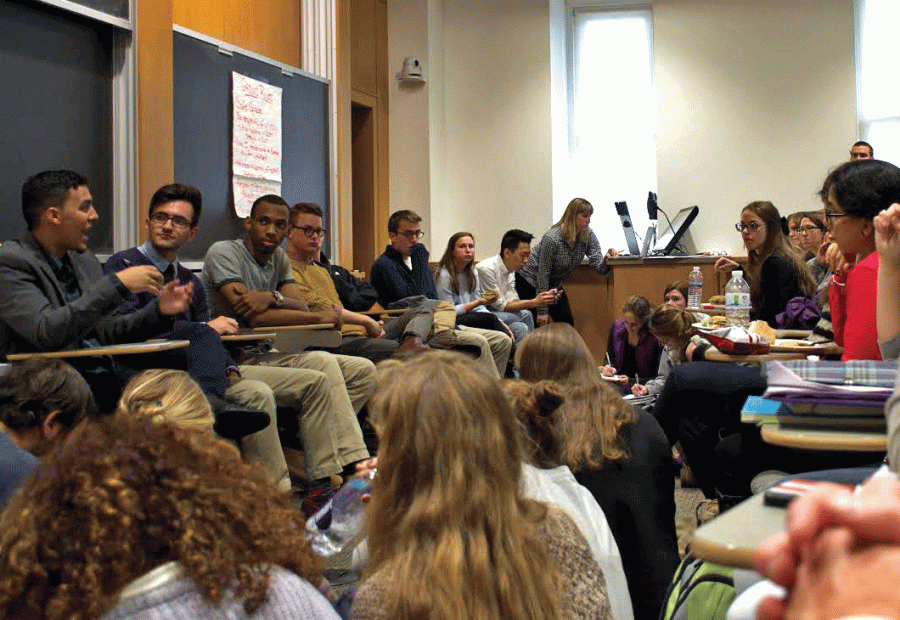All-Male Student Panel Addresses Sexual Climate on Campus
On Thursday, November 6, the Network sponsored its second all-male panel brown bag on sexual assault. The Network is a Max A. Shacknai Center for Outreach, Volunteerism and Education (COVE) group devoted to tackling issues related to sexual and relationship violence. This year, The Network’s student leaders – senior Kendall Murtha, junior Andrew Kil and junior Dannie Putur – brought back the all-male panel to bring men into the discussion about the sexual climate on college campuses.
Seniors James Carroll, Matt Carter and Nick Harper, junior Alex Schaff, and sophomores Manny Medina and Charles Polk spoke on the panel.
The panel spoke to a packed room of students and professors, both male and female. The six men were each asked questions about various topics, such as what is consent, what to do if a friend is sexually assaulted and why the panel exists at all. After some insightful responses, audience members voiced some questions. The Network leaders had to remind the audience that the panel weren’t experts.
“We need to learn and educate others about consent, learn our own sexual desires, and learn to communicate with one another while we learn the language and rhetoric to rebuke gray rape, victim blaming and bias,” Medina said.
Students were also reminded that the purpose of the panel was to begin a discussion on campus about sexual assault.
“I think people were interested in the male perspective in general, not necessarily my own personal opinions. But I do hope that what I said resonated with some people and perhaps shed light onto the often misunderstood male perspective,” Harper said.
Student leader of the Network senior Kendall Murtha said the panelists did a fantastic job of highlighting that sexual assault is not just a women’s issue, but a community issue.
“Women are often portrayed as the main activists in terms of the crusade against sexual assault, and it doesn’t have to be that way. Despite the potentially awkward start to the conversation, it’s a start to the conversation nonetheless, and one that our panelists proved men are interested in joining,” Murtha said.
“I hope that people seeing me and the other panelists really showed that this is not a one-sided cause and guys can be just as effective as women in terms of raising awareness and making sure they do everything in their power to prevent sexual assault,” Polk said.
While the male panelists shared their personal perspectives on the sexual climate at Colgate, they were not intended to be the voice of all college men.
“I think it’s important that we look at this issue from a male perspective, and I think people tend to classify all males on this campus as a certain type of person. Sometimes people neglect to hear what they think because they just assume that they all think and act the same way, which just is not true. It’s crucial to hear all sides of a conflict and this is just one of the many sides,” first-year Emily Brengle said.
“Not only do I think it was important for me to speak because I know people who have come up to me about being sexually assaulted, but I have seen sexual assault with my own eyes and know just how dangerous and traumatizing it can be. I want to make sure that crimes like that never happen on this campus and being a part of the panel was the first of many steps. Being a part of the panel was also a unique experience because statistically, men are often looked at as the perpetrators and not the ones who are standing up against the cause,” Polk said.
“There are already a lot of organizations on this campus doing great work to address this issue, and as my fellow panelist Matt Carter so articulately put it, it’s a matter of marketing those groups in such a way that men want to get involved,” Carroll said.
Carroll said that the panel was a way to facilitate a more open dialogue, which will help make more concrete action steps possible.
“I hope people that attended the panel understand that there are men on this campus that are indeed very passionate about working together to address this problem, and that if six ordinary guys can get that kind of discussion going about it, pretty much anybody can. Communication is the most important thing here,” Carroll said.




